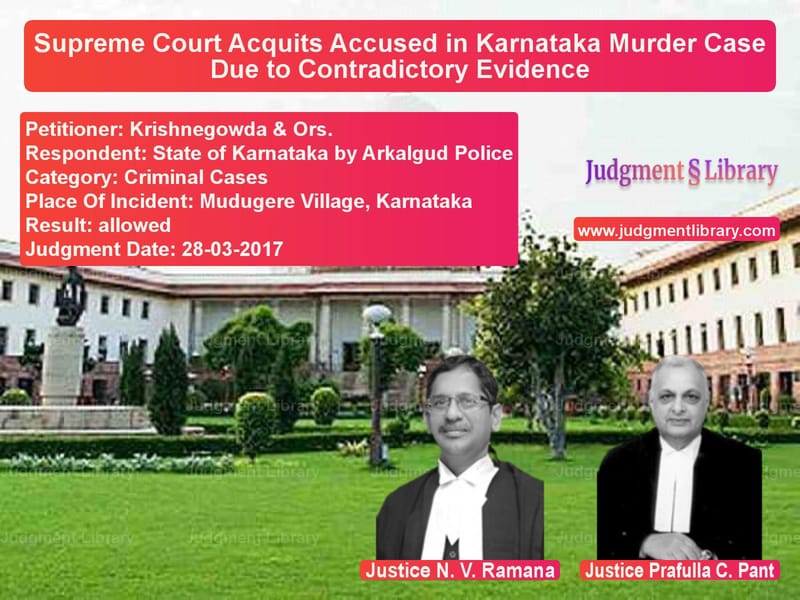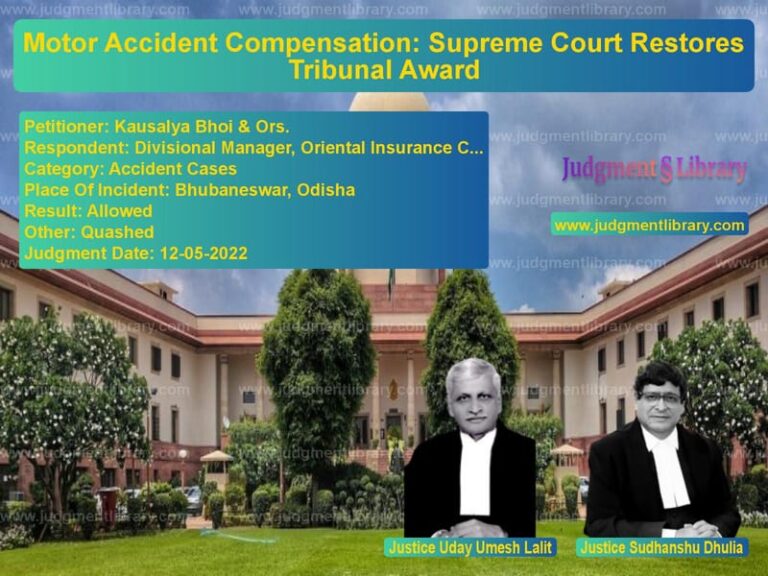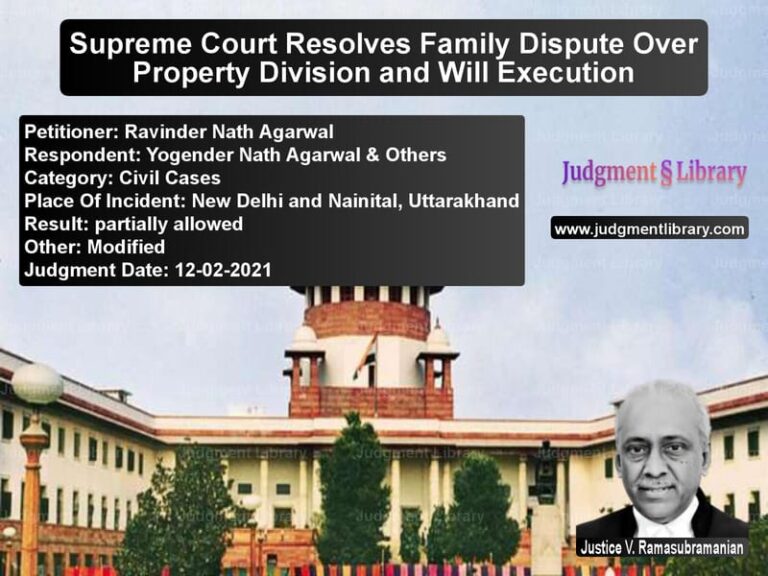Supreme Court Acquits Accused in Karnataka Murder Case Due to Contradictory Evidence
The Supreme Court of India, in the case of Krishnegowda & Ors. v. State of Karnataka, delivered a crucial judgment overturning the conviction of the accused in a long-standing murder case. The case revolved around the alleged murder of Chennegowda in Mudugere Village, Karnataka, following a violent altercation related to a land dispute. The trial court had acquitted the accused, but the Karnataka High Court later reversed this decision and convicted them. The Supreme Court reinstated the acquittal, citing inconsistencies in the prosecution’s evidence, lack of corroboration, and failure to prove guilt beyond a reasonable doubt.
Background of the Case
The case originated from a dispute over agricultural land between two factions in the village. On February 27, 1991, tensions escalated into a violent confrontation, leading to the death of Chennegowda and injuries to several others. The police registered an FIR against multiple individuals, including Krishnegowda, Nanjegowda, and others, under various sections of the Indian Penal Code (IPC), including Section 302 (murder), Section 324 (voluntarily causing hurt), and Section 149 (unlawful assembly).
Trial Court Proceedings
The trial court carefully examined the evidence and concluded that the prosecution had failed to establish the guilt of the accused beyond a reasonable doubt. The court’s reasoning included:
- Eyewitness contradictions: Several witnesses gave conflicting statements about the sequence of events, the weapons used, and the identity of the attackers.
- Lack of independent witnesses: All the prosecution witnesses were either related to the deceased or had a vested interest in the case.
- Forensic inconsistencies: Medical reports did not conclusively match the nature of injuries alleged by the witnesses.
- Failure to account for injuries on the accused: The defense argued that the accused had also sustained injuries, indicating a mutual scuffle rather than a premeditated murder.
Based on these findings, the trial court acquitted all accused, granting them the benefit of the doubt.
High Court’s Reversal and Conviction
The Karnataka High Court disagreed with the trial court and convicted the accused, stating that:
- The trial court had given undue weight to minor contradictions in eyewitness statements.
- The presence of multiple accused at the scene established common intent under Section 149 IPC.
- The medical evidence sufficiently corroborated the prosecution’s version of events.
- The land dispute provided a clear motive for the attack.
The High Court sentenced the accused to life imprisonment, rejecting their defense of self-defense and mutual scuffle.
Supreme Court’s Analysis
The Supreme Court scrutinized the case and found significant flaws in the High Court’s reasoning. The key observations included:
- Unreliable eyewitness testimony: The Court emphasized that contradictions in witness statements regarding the number of assailants, weapons used, and sequence of events created reasonable doubt.
- Lack of corroborative evidence: The prosecution failed to produce any independent witness who could confirm the version given by the complainants.
- Failure to prove common intent: The Court ruled that the High Court had incorrectly applied Section 149 IPC, as there was no evidence of pre-planned unlawful assembly.
- Medical evidence discrepancies: The injuries on the accused raised doubts about the prosecution’s claim that they were the aggressors.
- Investigation lapses: The Court criticized the police for failing to collect crucial forensic evidence and for not examining key witnesses.
Based on these findings, the Supreme Court concluded that the High Court had erred in convicting the accused. The Court reiterated that an appellate court should not interfere with an acquittal unless the trial court’s decision was manifestly perverse or unsustainable.
Key Judicial Precedents Cited
The Supreme Court relied on several past rulings to support its decision:
- Sharad Birdhichand Sarda v. State of Maharashtra (1984): This case established the principle that a conviction must be based on conclusive evidence and not mere suspicion.
- Murugesan v. State (2012): The judgment emphasized that an appellate court should not overturn an acquittal unless the trial court’s reasoning is completely unreasonable.
- Datar Singh v. State of Punjab (1974): The ruling reinforced the need for fair investigation and the role of independent witnesses in criminal cases.
Final Judgment
The Supreme Court set aside the Karnataka High Court’s conviction and reinstated the trial court’s acquittal. The Court held that:
- The prosecution failed to prove the case beyond a reasonable doubt.
- Eyewitness testimonies were contradictory and unreliable.
- Medical and forensic evidence did not support the prosecution’s claims.
- The benefit of the doubt must go to the accused.
As a result, all accused were acquitted, and any further legal proceedings against them were dismissed.
Impact of the Judgment
This ruling has significant implications for criminal jurisprudence in India:
- Emphasis on fair trial: The judgment reinforces the importance of due process and the presumption of innocence.
- Limitations on appellate interference: The case highlights the principle that High Courts should not overturn acquittals without compelling reasons.
- Importance of corroborative evidence: The ruling underscores the need for independent witnesses and forensic support in criminal trials.
- Safeguarding against wrongful convictions: By emphasizing the need for concrete proof, the decision helps prevent innocent individuals from being unjustly punished.
Conclusion
The Supreme Court’s judgment in Krishnegowda & Ors. v. State of Karnataka serves as a landmark ruling that upholds the fundamental principles of criminal justice. The case underscores the necessity of a fair trial, the burden of proof resting with the prosecution, and the importance of independent evidence. The judgment is a reminder that courts must be cautious while convicting individuals based on uncorroborated testimonies and unreliable forensic findings. With this decision, the Supreme Court has reaffirmed its commitment to justice and the rule of law.
Don’t miss out on the full details! Download the complete judgment in PDF format below and gain valuable insights instantly!
Download Judgment: Krishnegowda & Ors. vs State of Karnataka b Supreme Court of India Judgment Dated 28-03-2017.pdf
Direct Downlaod Judgment: Direct downlaod this Judgment
See all petitions in Murder Cases
See all petitions in Bail and Anticipatory Bail
See all petitions in Attempt to Murder Cases
See all petitions in Judgment by N.V. Ramana
See all petitions in Judgment by Prafulla C. Pant
See all petitions in allowed
See all petitions in supreme court of India judgments March 2017
See all petitions in 2017 judgments
See all posts in Criminal Cases Category
See all allowed petitions in Criminal Cases Category
See all Dismissed petitions in Criminal Cases Category
See all partially allowed petitions in Criminal Cases Category







